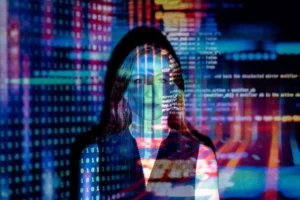What is Artificial Intelligence?
AI is like having a super-smart sidekick! It can analyze data in a snap, automate boring tasks, and find hidden gems in the info jungle. It’s a productivity powerhouse, making decisions easier and faster. AI can accelerate data analysis, automate repetitive tasks, and unveil hidden patterns. It enhances efficiency, accuracy, and productivity. AI also assists in delivering insights from massive datasets.
AI takes industries like healthcare, finance, and transportation to the next level, delivering tailor-made experiences and improving customer satisfaction. It’s the ultimate innovation engine, propelling us into a future where the possibilities are as vast as the galaxy.
How AI can replace Human Intelligence?
Now the question is that as the future is becoming more prominent and more shining , can we think that AI will replace or competate with human intelligence? In the future, AI may not necessarily replace human intelligence, but it could argument or enhance abilities. The main objective is to keep both of them align in same manner that human intelligence brings creativity, intuition, and a deep understanding of emotions, while AI adds its analytical prowess and lighting-fast processing. It’s a one-of-a-kind collaboration that pushes the boundaries of what’s possible, unlocking a world of innovation and limitless potentials. Following are some key elements that distinguish human intelligence from artificial intelligence:
EMOTIONS ANALYZATION:
When it come to emotions, the power of human intelligence shines. From love and joy to sadness and fear, emotions are deeply woven into our human experience. Emotions play a vital role in our decision-making processes, shaping our perceptions, motivations and interactions with others. The ability to emphasize, understand nuances, and respond appropriately in social situations are unparalled. While AI can mimic emotions to some extent, it lacks the genuine emotional experience that human possess. Humans understand the complexities of ethical dilemmas, make subjective judgments, and navigate moral grey areas. AI, on the other hand, relies on predefined rules and algorithms, limiting its ability to handle complex ethical decisions.
HUMAN CONNECTIONS :
Human possess an innate need for social interaction, empathy, and companionship. It’s more plausible to envision a future. While AI chatbots and virtual assistants can simulate conversations, chatbot artificial intelligence they cannot genuinely understand human emotions or provide the same level of empathy and support that a human friend can offer.
ELEMENTS OF CONSCIOUSNESS AND SELF AWARENESS:
Human intelligence is like a symphony, where each instrument plays a unique role, harmonizing and creating a masterpiece. Human possess a sense of being awareness of our own thoughts, feelings, and existence. We have a subjective experience of the world. While, AI learns from data, it lacks the inherent self-awareness that give depth and a sense of identity.AI is like a dazzling soloist, capable of flawlessly executing complex melodies.
CONSULTANTS OVERVIEW
AI is like the speed racer of cognitive abilities, crunching data, recognizing patterns, and making lightning-fast calculations. It’s like having a supercomputer on steroids. But human intelligence have a creativity that can paint masterpieces, and empathy that can heal hearts. When AI and human intelligence blend, it’s like a symphony of brilliance and imagination, creating an orchestra of possibilities that no single intelligence could achieve alone. It is more plausible to envision a future where AI collaborates with human intelligence.

